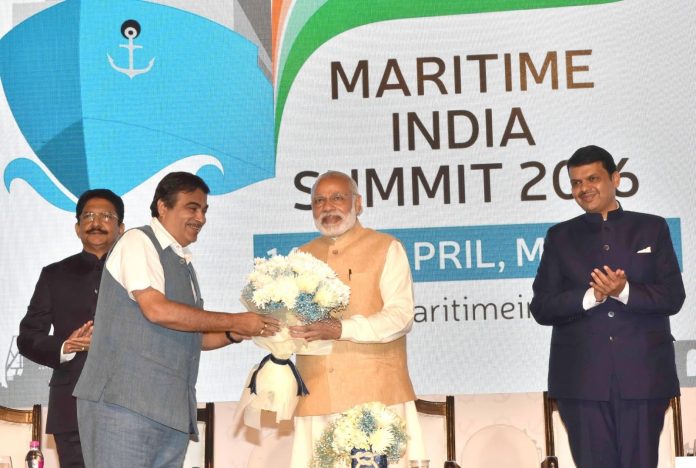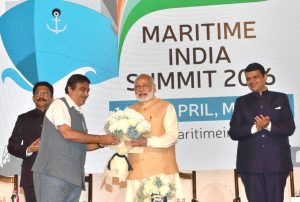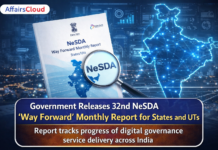Feature: The first Maritime India Summit
Venue: Mumbai
Investment: Rs 82,905 crore
Key Role: Port led development for faster and sustainable economic growth
Participation: More than 5000 delegates 42 countries participated in the Summit
Sessions: 13 thematic sessions and 3 special sessions on various aspects of maritime sector
Delegates: Prime Minister of India, Mr. Kim Young Suk, Minister of Oceans and Fisheries, Government of the Republic of Korea, Union Shipping Minister, Chief Minister Shri. Devendra Fadnavis and Governor of Maharashtra Shri. Anandiben Patel
Highlights:
- Global nature of the shipping industry and the importance of co-operation & collaboration between maritime nations

- Investment opportunities in various maritime States and Union Territories of India
- Sectoral seminars on shipbuilding and ship repair, skill development through maritime education, inland waterways development, cruise shipping and lighthouse tourism, fisheries development and maritime security, which saw serious deliberations.
- Highlighted the strengths of Korea as a Maritime Nation especially in Ship Building, Maritime technology, Port led Development, Maritime Financing and Maritime Security.
Maritime Heritage Museum – A top draw
Built in the form of a container ship with interiors resembling a Spanish Galleon which is 5000 years rich maritime heritage of India
India, South Korea signed MoU for cooperation and mutual assistance in development of Ports
Signed by:
- Shri Nitin Gadkari, Minister of Road, Transport and Highways and Shipping, Government of the Republic of India
- Mr. Kim Young Suk, Minister of Oceans and Fisheries, Government of the Republic of Korea
Venue: Mumbai
Highlights:
- Help both countries to encourage and facilitate the development of ports, port related industry, maritime relationship
- Cooperate in the tasks of sharing of technology, experiences in the fields of port development and operation, exchange of information on construction, building, engineering and related aspects in the field of port development
- Joint participation in port-related construction, building and engineering projects that both parties are interested in, exchange of experts including officials from the relevant ministries of each country in the field of port, and related education and training, other types of cooperation that may be mutually agreed upon between the two countries
PM Modi pitches for Rs. 1 Lakh Crore investment for Port Development
Investment: 1 Lakh Crore
Highlights:
- Double port Capacity to 3000 million tonnes by 2025
- Additional capacity of 317 million tonnes per annum
- Five new ports are planned to meet the increasing demand of the Exim trade
- Promote coastal shipping coupled with the anticipated rise in the domestic production of coal.
- 250 projects with investment opportunity in the maritime sector, including infrastructure development opportunities in 12 major ports, projects in eight maritime states, and other agencies
- More than a hundred of these projects have also been identified under the government’s ambitious Sagarmala Project, which seeks to develop a string of ports along India 7,500-kilometres coastline
Maiden Maritime India Summit draws enthusiastic investor response – 140 agreements signed
A total of 141 MoUs and Business Agreements were signed by various players in maritime sector including Major Ports, State Maritime Boards and PSUs like Shipping Corporation of India, Cochin Shipyard Limited, Inland Waterways Authority of India etc.
Projects for which agreements have been signed cover a wide spectrum of activities including
- Modernisation of existing ports and establishment of new ones.
- Development and extension of Inland Waterways.
- Enhancement of cargo handling capacity of Indian ports.
- Improving hinterland connectivity of ports through road and rail network.
- Upgradation of educational and training facilities for maritime sector.
- The National Perspective Plan of Sagarmala project, which was released by the Prime Minister Sh. Narendra Modi on April 14, underlined Government’s seriousness in boosting port led infrastructure development.
Sagarmala National Perspective Plan Released
Highlight:
- Promote port-led development in the country
- Substantially reducing export-import and domestic trade costs with a minimal investment
Four Strategic Levers:
- Optimizing multi-modal transport to reduce the cost of domestic cargo
- Minimizing the time and cost of export-import cargo logistics
- Lowering costs for bulk industries by locating them closer to the coast
- Improving export competitiveness by locating discrete manufacturing clusters near ports.
Focus 1: Specific opportunities for transportation of commodities such as thermal coal, fertilisers, foodgrains, cement and steel by coastal shipping and inland waterways.
Focus 2: port connectivity
Focus 3: To tap into the potential of port-led industrialization to boost industrial and export growth along the coastline
Focus 4: the potential of coastal communities will be harnessed by focused skill-development to support port-led industrialization
Top maritime industries show Rs 35,000 crore investment intentions for Gujarat
Investment: Rs.35,000 crore
- Ahmedabad correspondent reports that the maritime industry has shown keen interest in future projects along the 1,600-km long coastline of Gujarat






